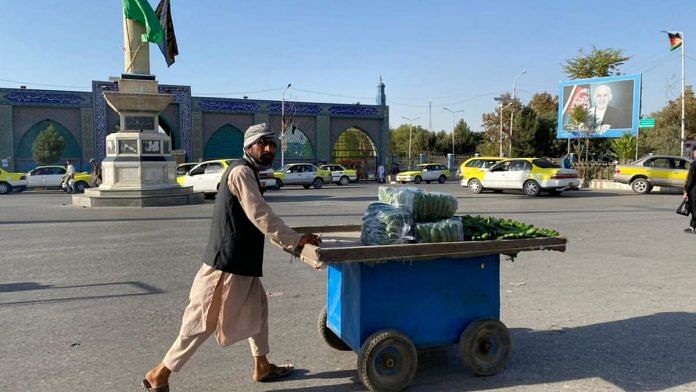
Mazar-e-Sharif: Afghan government forces backed by a local warlord have managed to push back the Taliban targeting the holy city of Mazar-e-Sharif Monday as India shut its consulate there and evacuated diplomats and other Indian nationals amid fears that the city could fall to the insurgents.
With Kabul focusing on keeping the Taliban at bay from this key northern city, President Ashraf Ghani arrived here Wednesday to take stock of the situation and chalk out a comprehensive plan on how to defend the north.
He will hold talks with Ata Mohammad Noor, the local warlord who is the leader of the Jamiat-e-Islami and a former governor of Balkh province of which Mazar is the capital, Abdul Rashid Dostum, a former vice president who was once a key leader of the Northern Alliance that fought the Taliban back in the 1990s, and Hazara warlord Mohammed Mohaqiq.
The Afghan army, meanwhile, has claimed that it has killed 170 Taliban fighters in Dehdadi district of the province.
Ghani’s trip to Mazar, sources say, may once again revive the erstwhile Northern Alliance, an anti-Taliban militia group that was active in the 1990s.
It appears that the plan is to create one comprehensive militia force and chalk out a strategy to take on the Taliban in a whole new avatar, sources said.
On Tuesday when the Taliban was pushed back, Noor had presided over a meeting where he discussed “the formation of small-scale units, the strengthening of front lines, clearing plans, and the use of guerilla warfare,” he said in a tweet.
روی آمادگیها، تشکیل قطعات ریزرف، تقویه خطوط مقدم، برنامههای پاکسازی و استفاده از جنگهای گوریلایی بحث صورت گرفت.
همچنان در رابطه به نکات ضعف و آسیبپذیری، کاستیها وکمبودات، تأمین ارتباطات مخابروی وآمادگیهای لازم محرم برای قدمهای بعدی جنگ نیز بحث های مفصلی صورت گرفت.— Ata Mohammad Noor (@Atamohammadnoor) August 10, 2021
“There were also detailed discussions on weaknesses and vulnerabilities, shortcomings and deficiencies, providing telecommunications and Muharram’s necessary preparations for the next steps of the war,” he further said.
Life continues in Mazar-e-Sharif
Mazar-e-Sharif has always lived in potential danger from Taliban forces. In August 1998, the city witnessed a massacre as the Taliban took over the city, brutally killing hundreds of innocent civilians.
Amid this threat to safety, life at Mazar-e-Sharif has been continuing as it always has. For the residents here, it does not matter whether the Taliban or the Afghan government take the control; they believe only Ata Noor can give them “real protection”. What people really want, though, is jobs and development, a cab-driver based in the city told ThePrint, requesting anonymity.
“These are political issues … We are not afraid of the Taliban. They are Muslims, we are also Muslims. We are brothers. If it was a kafir (a non-Islam believer), then we would have fought them as mujahideens. They (the Taliban) are also Afghans like us … it doesn’t matter, let them come and let them go,” said one of the main in-charges of the Blue Mosque, or the Shrine of Hazrat Ali, an important landmark in the city.
The Shrine of Hazrat Ali houses a library as well as a museum, things which the Taliban detests. But according to the priest, the library or the museum will not be impacted if the Taliban comes to power.
(Edited by Manasa Mohan)
Subscribe to our channels on YouTube & Telegram
Why news media is in crisis & How you can fix it
India needs free, fair, non-hyphenated and questioning journalism even more as it faces multiple crises.
But the news media is in a crisis of its own. There have been brutal layoffs and pay-cuts. The best of journalism is shrinking, yielding to crude prime-time spectacle.
ThePrint has the finest young reporters, columnists and editors working for it. Sustaining journalism of this quality needs smart and thinking people like you to pay for it. Whether you live in India or overseas, you can do it here.